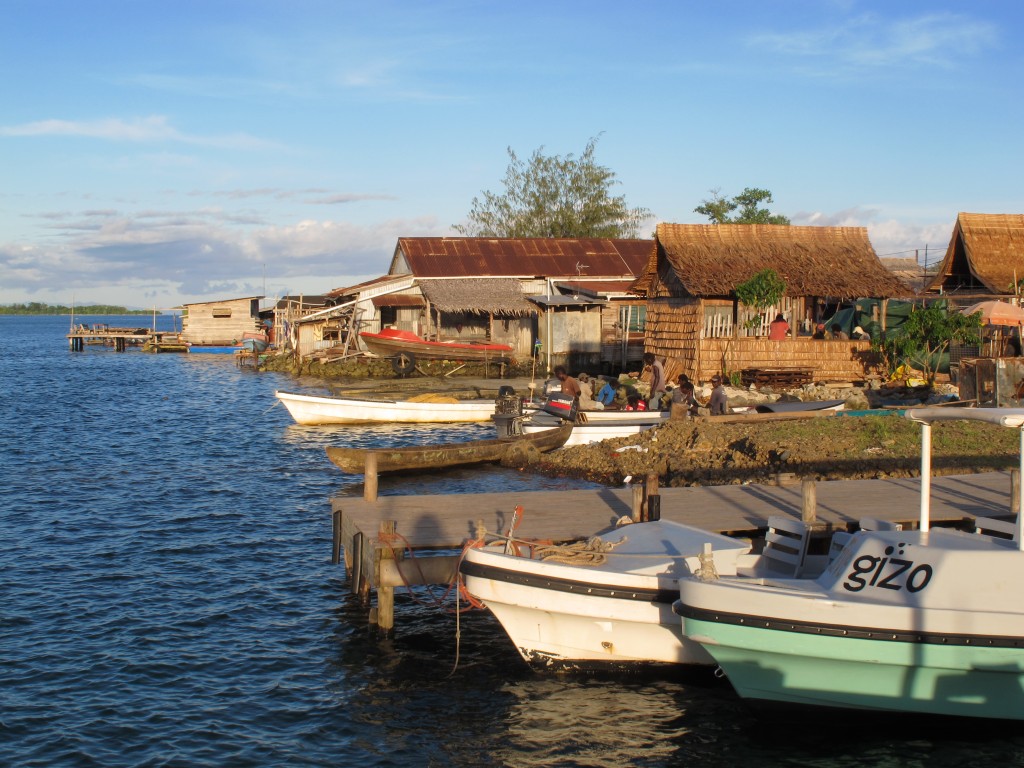The Gilbert Islands [Kiribati] are, what you call, now, dangerous, high tides and flood. It’s alright in the Solomon Islands, there are mountains.
As the sea-level rises, the fate of people in low-lying Pacific island nations like Kiribati, Tuvalu, and the Marshall Islands is uncertain. The growing cost and challenge of adaptation could eventually drive large-scale resettlement to countries safer from the rising sea like New Zealand and Australia.
How will people be received? What challenges will they face adjusting to a new environment? Will they be able to maintain their culture? There are no easy answers to these questions, but the past may be a guide.
The above quote is from an elderly man who was part of a mid-20th century British colonial program that relocated roughly 2,300 people from the Gilbert and Phoenix Islands to hilly Ghizo in the distant Solomon Islands because of fears of resource constraints and overcrowding. I interviewed him in 2011 during a visit to Ghizo. I wanted to learn about the Gilbertese* resettlement experience and see if there were any lessons for future climate change-driven resettlement of people from Kiribati and nearby atoll nations.
It was a fascinating and moving experience. Just a few years before, a tsunami had struck tiny Ghizo, taking a large physical and emotional toll on the small Gilbertese community. Another elder described the events to me:
When it [the lagoon] was drying up, they were surprised, they went to go see the sea, rather than running up the hill for their lives. They kept being surprised, then it was too late.
Of the fifty people killed, thirty were Gilbertese, including many children. Despite three generations in the earthquake- and tsunami-prone Solomon Islands, many people in the community did not know the signs of an impending tsunami (see the terrific 2009 paper by Brian McAdoo and colleagues). This gap in cultural knowledge and the challenges of rebuilding after the tsunami revealed some of the many unforeseen long-term consequences of resettling in a new environment and society.
The history of the Gilbertese resettlement and the lessons from my interviews are described in a new paper in the journal Natural Resources Forum. The paper reveals how uncertainty about land rights still persists, 60 years after the original resettlement, and is linked to a number of other present-day challenges the community faces.
The findings may help inform thinking about resettlement due to climate change – including the importance of establishing and funding permanent mechanisms for dealing with land and resource disputes. I also hope that describing the Gilbertese experience can, in general, help disavow the mistaken popular idea that there is “empty” land in other countries where the people of Kiribati and other low-lying islands can easily resettle.
A personal note: This research was made possible by many people who were willing to share often difficult thoughts and memories, but who must remain nameless due to research ethics. No thank you can be adequate. All I can say is that, for a decade now, I have traveled to the Pacific Islands and back to learn about climate change and people’s capacity to adapt. Each trip, I come home changed by the incredible generosity, openness, and overall decency of the people I meet.
Sources:
Donner, S.D., 2015. The legacy of migration in response to climate stress: Learning from the Gilbertese resettlement in the Solomon Islands. Natural Resources Forum, 39: 191-201.
McAdoo, B.G., Moore, A., Baumwoll, J., 2009. Indigenous knowledge and the near field population response during the 2007 Solomon Islands tsunami. Natural Hazards 48: 73-82.
* The colonial term “Gilbertese” is used because the Solomon Islands community, established before Kiribati’s independence, self-refer as Gilbertese rather than as i-Kiribati. The word Kiribati itself is derived from the pronunciation of Gilberts (kee-ree-bas) in the local language.

